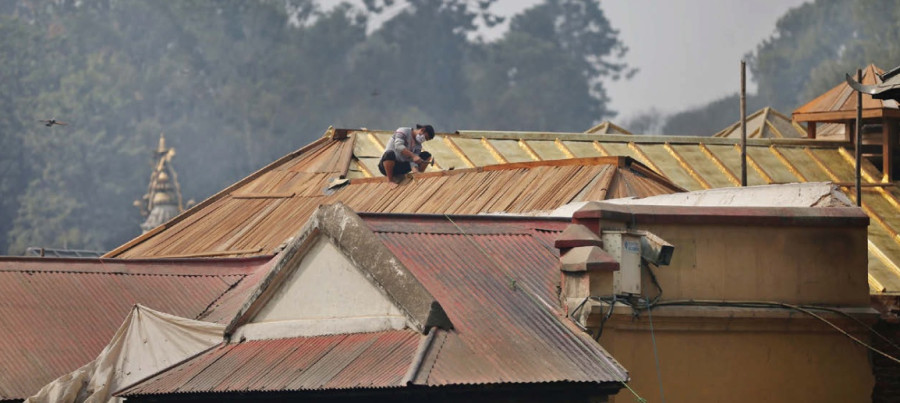Valley
Conservationists accuse Pashupati trust of gross negligence in post-quake reconstruction
They say the trust is doing more harm than good by using concrete and altering structures of monuments.
Anup Ojha
In a bid to halt the “concretisation” of various structures on Pashupatinath premises, a group of conservation activists and local residents submitted a memorandum to the Pashupati Area Development Trust on Thursday.
In the memorandum, they also listed fifteen alleged actions that illustrate irresponsible behaviour on the part of the trust while working on UNESCO world heritage site, the activists and local residents said.
“The government handed over the management of the temple to the trust, the Department of Archeology and Guthi Sansthan to maintain its historical, religious, cultural, natural and archaeological value and hand it over to the next generation,” read the memorandum. “But the trust is destroying historical, religious, cultural, ecological and archaeological aspects of the monuments on the premises in the name of development.”
The petitioners say that the trust hasn’t complied with various court orders in the past with regard to development work on the temple premises. Accusing the trust of using concrete for reconstruction work, a group of activists filed a writ petition at the Supreme Court on January 29, 2019 demanding an order to halt such activities.
In their memorandum, the activists have pointed out how the trust used concrete in ongoing reconstruction work in Guheshwori. They have also expressed concern over the trust’s demolition of the Shree Bambai Dhukuti (where expensive ornaments of the shrine were kept) without the involvement of stakeholders. They have accused the trust of not doing enough to stop the encroachment of the temple’s land at Bankali and spending money on unnecessary beautification of the compound.
The court on February 6 passed a verdict in the case ordering the trust to comply with the provisions of the Ancient Monument Preservation Act 2013, which state that, structures over 100 years old must be preserved in their original form, and any modification requires authorisation from the Department of Archaeology.
“But the trust doesn’t listen to anyone. It has never consulted experts. In the name of development, it is destroying tangible and intangible heritage on the Pashupati premises,” said Narotam Baidya, former treasurer of the trust, member of Province-3 assembly and one of the petitioners.
“The trust started working on post-quake reconstruction without preparing a complete master plan,” said Baidya, also a resident of the area.
According to the trust, the 2015 earthquake damaged 93 monuments on the premises and 42 of the monuments are yet to be reconstructed or renovated.
“The trust has carried out reconstruction work just for the sake of it,” said youth heritage activist Ganapati Lal Shrestha. “It has used concrete everywhere and not abided by the court’s decision.”
The memorandum comes as the trust, only last month, forcefully installed a 96 kg golden jalahari in the main shrine amid the criticism from locals, heritage conservationists and priests.
“The trust used concrete to renovate Jaya Bageshwori temple, Bishorupa Temple and the demolished travellers’ rests on the premises. Numerous ongoing activities are against the spirit of the Monument Act and UNESCO heritage norms,” said Shrestha.
“There has been so much negligence in the name of reconstruction...concrete has been used everywhere,” said Sanjay Adhikari, a law student and youth activist. “The trust is not serious about preserving the authenticity and integrity for these monuments which have both religious and archeological value.”
In their memorandum, the conservationists have demanded that the trust take action against contractors who use concrete. They have threatened to move court if their demand is not met.
The trust’s Executive Director Ghanashyam Khatiwada told the petitioners that his office will respond to the memorandum in writing. “The trust will give written statements, and we will also look at the issues raised in the memorandum,” said Khatiwada.




 9.89°C Kathmandu
9.89°C Kathmandu.jpg)














